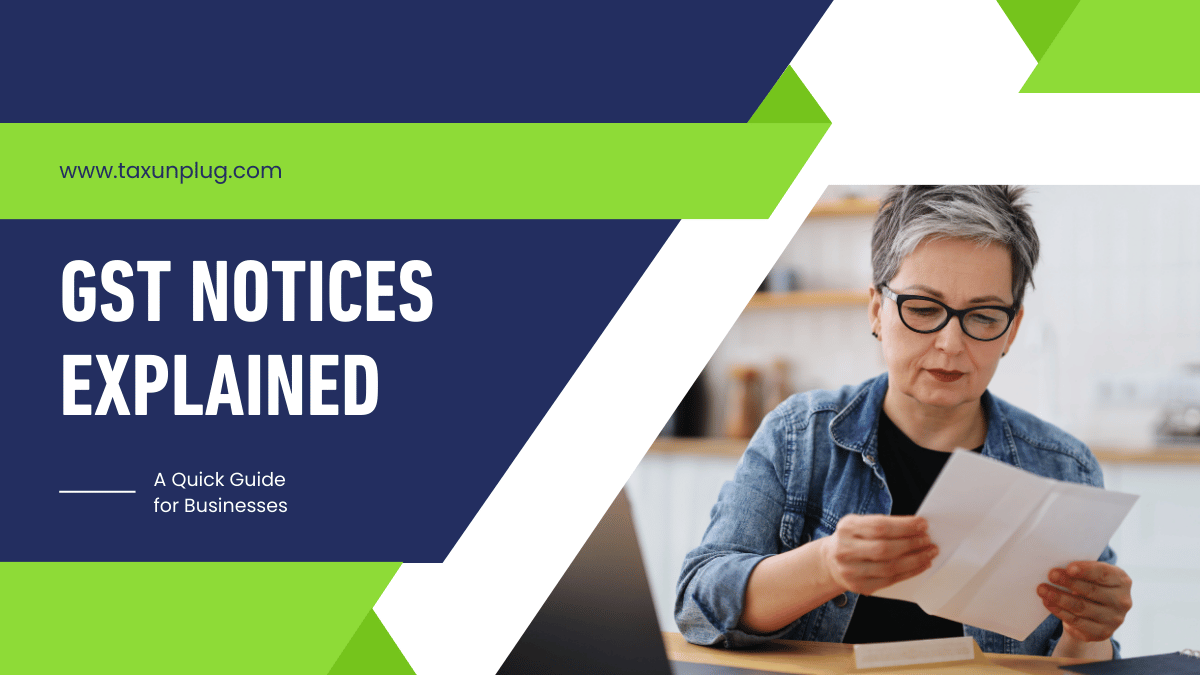GST Notices Explained:
In India, GST (Goods and Services Tax) is an essential component of the tax system. While GST streamlines taxation, businesses frequently receive GST notices for various compliance difficulties. This tutorial covers the many sorts of GST notices and how firms in Mumbai, Surat, Pune, Jodhpur, Jaipur, and Ahmedabad may effectively manage them.
What is a GST Notice?
A GST notice is an official communication sent by the tax authorities to businesses for various reasons, such as discrepancies in GST filings, tax evasion suspicions, or audit requirements. Receiving a GST notice does not always indicate wrongdoing; it’s often a call for clarification or compliance.
Common Reasons for Receiving GST Notices
- Mismatch in GST Returns: Discrepancies between GSTR-1, GSTR-3B, and GSTR-2A.
- Late GST Filings: Missing deadlines for GST return submissions.
- Excess Input Tax Credit (ITC): Claiming more ITC than allowed.
- Tax Payment Shortfall: Underpayment or non-payment of GST dues.
- GST Registration Issues: Errors in business details or registration processes.
- Audit or Inspection: Random or risk-based audits conducted by tax authorities.
Types of GST Notices
1. Notice for Filing Returns (Form GSTR-3A)
Issued when a business fails to file GST returns on time.
2. Scrutiny Notice (Section 61)
Sent if the tax officer finds inconsistencies in filed returns.
3. Show Cause Notice (SCN)
A formal notice asking the taxpayer to explain discrepancies or justify actions.
4. Demand Notice (Section 73/74)
Issued when tax is unpaid or short-paid, either due to error (Section 73) or fraud (Section 74).
5. Audit Notice (Section 65)
Received if your business is selected for a GST audit.
Steps to Respond to a GST Notice
- Read the Notice Carefully: Understand the issue and required action.
- Gather Documents: Collect necessary records like invoices, returns, and payment details.
- Consult a Tax Expert: Seek professional help from TaxUnplug, the Tax Consultant in India, for accurate responses.
- Respond Within Deadline: Submit your reply within the specified timeframe.
- Rectify Errors: If the notice highlights mistakes, correct them in your GST portal.
Tips to Avoid GST Notices
- File Timely Returns: Meet deadlines for all GST filings.
- Reconcile Data Regularly: Ensure GSTR-1, GSTR-3B, and GSTR-2A match.
- Maintain Records: Keep invoices, receipts, and transaction details updated.
- Avoid Excess ITC Claims: Claim input tax credit only as per rules.
- Hire Professionals: Engage TaxUnplug, the Tax Consultant in India, to manage your GST compliance.
Why Choose TaxUnplug for GST Services?
TaxUnplug, the Tax Consultant in India, provides expert assistance for GST compliance. Whether you’re based in Mumbai, Surat, Pune, Jodhpur, Jaipur, or Ahmedabad, we’re here to help you manage your GST notices efficiently.
Frequently Asked Questions
1. Can I avoid GST notices completely?
While you can’t avoid random audits, maintaining proper compliance can significantly reduce the chances of receiving GST notices.
2. What is the penalty for non-compliance with a GST notice?
Penalties vary depending on the type of notice and issue. Consult TaxUnplug, the Tax Consultant in India, for detailed information.
3. What should I do if I receive a GST notice?
You should carefully read the notice, understand its requirements, and respond within the deadline. Consult TaxUnplug for expert guidance.
4. How can I check the status of my GST notice?
Log in to the GST portal and navigate to the “Notices and Orders” section to view the status of your notice.

Conclusion
GST notices are a part of the taxation process and not always a cause for worry. By understanding their types and ensuring timely compliance, businesses in Mumbai, Surat, Pune, Jodhpur, Jaipur, and Ahmedabad can manage them effectively. Partnering with TaxUnplug, the Tax Consultant in India, ensures smooth handling of all GST-related issues.

